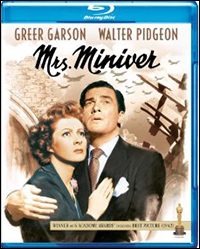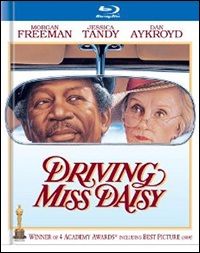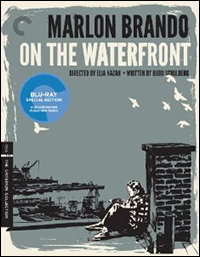
*
Not only did these titles win the Big Prize; they took a combined 19, with 34 nominations overall. Awards only mean so much, of course; these happen to be four excellent films, though, each of which holds up well as many as 80 years later.
The earliest of the four is M-G-M's Grand Hotel [Warner Home Video], and grand it is indeed. Producer Irving Thalberg stocked the movie with some of his biggest stars, led by Greta Garbo (who indeed says "I vant to be alone"), John Barrymore, Joan Crawford, Wallace Beery and Lionel Barrymore. This is the granddaddy of those interwoven melodramatic tales, with several stories taking place simultaneously. Here we have an aging ballerina (Garbo) whose career is fading away, an indigent Count (John Barrymore) whose fortune is faded away, a luckless stenographer (Crawford) whose hope is fading away, a bullish industrialist (Beery) whose reputation is fading away, and a mousey bookkeeper (Lionel Barrymore) whose life is fading away. All rushing in and out through the revolving door of the Grand Hotel, Berlin.
All the characters — and all the performers — are compelling. Most arresting upon this viewing was John Barrymore. Through every scene he seems to be weighing his options, thinking things out while the others are speaking, and fully aware of his inevitable doom. We are told that Barrymore was one of the great actors of his day. This performance came relatively late in his career — he was already 50y, and died at 60 — but watched closely, Barrymore gives us quite a lesson.
While this was indeed the 1932 Best Picture winner — in the fifth year of the Oscars — it holds a record as the only Best Picture not to be nominated in any other categories. Beery did win the Best Actor award that year, tied with Fredric March for "Dr. Jekyll and Mr. Hyde." But Beery won for "The Champ," not "Grand Hotel." Visit PlaybillStore.com to check out theatre-related DVDs for sale.
 |
||
| Cover art |
And then there's the 26-year-old Richard Ney. He boosted his career the following year by marrying his screen mother, the much older Ms. Garson. He soon scuttled his career by treating her miserably, with accusations of abuse ending in divorce in 1947. Ney's other claim to show biz infamy was as producer of the 1957 Broadway fiasco, Portofino. This is the one about which Walter Kerr wrote that he would not "say that Portofino is the worst musical ever produced, because I've only been seeing musicals since 1919." Garson herself came to Broadway shortly thereafter, replacing the aforementioned Ms. Russell as Auntie Mame. She returned in 1979, as coproducer of On Golden Pond. Back in the days when Broadway plays could make do with only two producers.
Visit PlaybillStore.com to check out theatre-related DVDs for sale.
 |
||
| Cover art |
Visit PlaybillStore.com to check out theatre-related DVDs for sale.
 |
||
| Cover art |
To say that Brando, Malden, Cobb and Steiger are phenomenal in these roles is to state the obvious. Breathtakingly good, all of them. (In one of those cruel twists of Oscar fate, Malden, Cobb and Steiger received featured actor nominations against each other, allowing a lesser actor in a lesser film to sneak in and take the prize.) Saint matches them, in her film debut; she won the Featured Actress award, while Brando took Best Actor.
Kazan and screenwriter Budd Schulberg won awards as well; it was an "On the Waterfront" juggernaut that year. The main loser among the production staff was composer Leonard Bernstein. Loser of the Oscar, that is; his score for "Waterfront" is one of Hollywood's best, and Bernstein fans who don't know this music should stop what they are doing right now and order a recording of his "Symphonic Suite from On the Waterfront" (which can be found on the Naxos collection "Chichester Psalms" among other CDs). The score can be seen as Bernstein's critical step toward West Side Story in 1957.
But the score is only one of the elements. Everything — and every major participant — is at their best in "On the Waterfront." A true classic, with the Oscar-winning cinematography (by Boris Kaufman), art direction (by Richard Day) and editing (by Gene Milford) enhanced by Criterion's new Blu-ray restoration. The two-disc set is packed with special features, with previously available bonuses mixed with a handful of new interviews (with Eva Marie Saint, Martin Scorsese and others) plus a new documentary on the making of the film. Criterion also gives us a fascinating booklet including one of the original Malcolm Johnson articles from the Sun; a piece by Schulberg; and Kazan's defiant defense of his testimony before the HUAC, which he ran as a paid advertisement the next day in the New York Times.
Visit PlaybillStore.com to check out theatre-related DVDs for sale. (Steven Suskin is author of "Show Tunes," "The Sound of Broadway Music: A Book of Orchestrators and Orchestrations," "Second Act Trouble," the "Broadway Yearbook" series and the "Opening Night on Broadway" books. He also pens Playbill.com's Book Shelf and On the Record columns. He can be reached at [email protected].)









